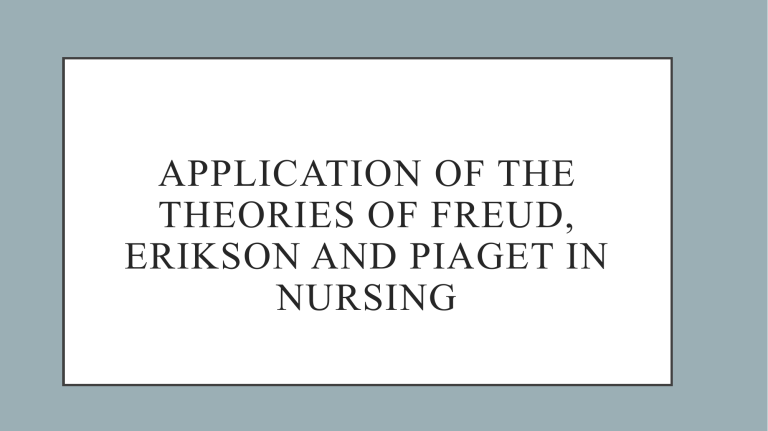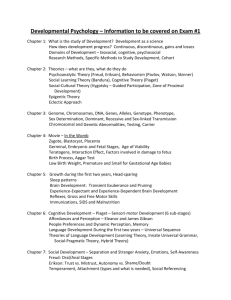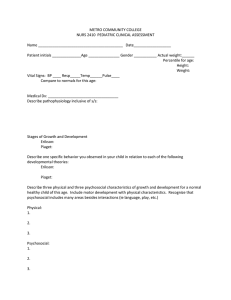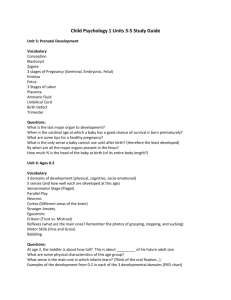
APPLICATION OF THE THEORIES OF FREUD, ERIKSON AND PIAGET IN NURSING AGE GROUP DEV’TAL STAGES NURSING APPLICATIONS Oral stage (Freud): The When a baby is to have nothing by mouth, nfant (Birth to baby obtains pleasure and offer a pacifier if not contraindicated. comfort through the mouth After painful procedures, offer a baby a bottle year) or pacifier, or have the mother breastfeed. Trust vrs Mistrust stage (Erikson): The baby establishes a sense of trust when basic needs are met Sensori-motor stage (Piaget): The baby learns from movement and sensory input Hold the hospitalised baby often. Offer comfort after painful procedures. Meet the baby’s needs for food and hygiene. Encourage parents to room-in. Manage pain effectively with use of pain medications and other measures. Use crib mobiles, manipulative toys, and bright colours to provide interesting stimuli and comfort AGE GROUP DEV’TAL STAGES NURSING APPLICATIONS Toddler (1-3 years) Anal stage (Freud): The child derives gratification from control over bodily excretions Ask about toilet training and the child’s rituals and words for elimination during admission history. Continue child’s normal patterns of elimination in the hospital. Do not begin toilet training during illness or hospitalisation. Accept regression in toileting during illness or hospitalization. Have potty chairs available in hospital and childcare centres. Autonomy vrs Shame and Doubt stage (Erikson): The child is increasingly independent in many spheres of life Allow self-feeding opportunities. Encourage child to remove and put on own clothes, brush teeth or assist with hygiene. If restraint for a procedure is necessary, proceed quickly, providing explanations and comfort. Sensori-motor stage (end), Ensure safe surroundings to allow opportunities to preoperational stage (beginning) manipulate objects. (Piaget): The child shows increasing curiosity Name objects and give simple explanations and exploitative behaviour. Language AGE GROUP DEV’TAL STAGES NURSING APPLICATIONS Pre-schooler (3-6 years) Phallic Stage (Freud): The child initially identifies with the parent of the opposite sex but by the end of this stage would have identified with the same- sex parent. Be alert for children who appear more comfortable with male or female nurses, and attempt to accommodate them. Encourage parental participation in care. Plan for playtime and offer a variety of materials from which to choose. Offer medical equipment for play to lessen anxiety about strange objects. Assess children’s concerns as expressed through their drawings. Accept the child’s choices and expressions of feelings. Offer explanations about all procedures and treatments. Clearly explain that the child is not responsible for causing the illness Initiative Vrs Guilt Stage (Erikson): The child likes to initiate play activities. Offer medical equipment for play to lessen anxiety about strange objects. Assess children’s concerns as expressed through their drawings. Accept the child’s choices and expressions of feelings. Preoperational Stage (Piaget): The child is Offer explanations about all procedures and increasingly verbal but has some limitations in treatments. Clearly explain that the child is not thought processes. Causality is often confused, so the child may feel responsible for causing the responsible for causing the illness illness. AGE GROUP DEV’TAL STAGES NURSING APPLICATIONS School-age (6-12 years) Latency Stage (Freud): The Provide gowns, covers and underwear. child places importance on privacy Knock on door before entering. Explain treatments and understanding the body. and procedures. Industry vrs Inferiority Stage (Erikson): The child gains a sense of self- worth from involvement in activities Encourage the child to continue school work while hospitalised. Encourage child to bring favourite pastimes to the hospital. Help the child to adjust to limitations on favourite activities. Concrete Operational Stage (Piaget): The child is capable of mature thought when allowed to manipulate and see objects. Give clear instructions about details of treatment. Show the child equipment that will be used in treatment. AGE GROUP DEV’TAL STAGES Adolescent (12-18 years) Genital Stage (Freud): The adolescent’s focus is on genital function and relationships Identity vrs Role Confusion (Erikson): The adolescent’s search self-identity leads to independence from. Parents and reliance on peers. Formal Operational Stage (Piaget): The adolescent is capable of mature, abstract thought NURSING APPLICATIONS Ensure access to gynaecologic care for adolescent girls. Provide information on sexuality. Ensure privacy during healthcare. Have brochures and videos available for teaching about sexuality. Provide a separate recreation room for teens who are hospitalised. Take health history and perform examinations without parents present. Introduce adolescent to other teens with same health problem. Give clear and complete instructions/information about healthcare and treatments. Offer both written and verbal instructions. Continue to provide education about the disease to the adolescent with a chronic illness, as mature thought now leads to greater understanding.


